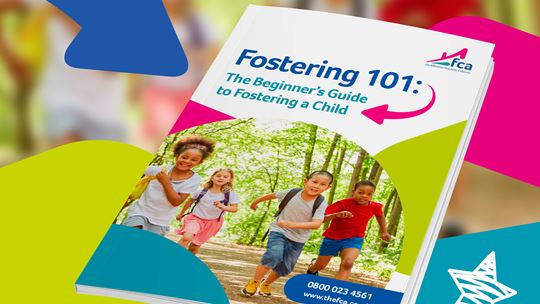What Type of Foster Care Could You Offer?
Making the decision to become a foster parent is a life-changing career move – both for you and the children you will be caring for.
Whether you’re looking for a rewarding new career or are just passionate about helping vulnerable children and young people, using your transferable skills from previous job roles, along with our support, will give you everything you need to be a great foster parent.

The different foster care types
When you first start looking into foster care as a career, you’ll be presented with the different types of foster care. While some children may need fostering for just a couple of nights, others need a more long-term placement. And, as no two children are the same, some cases can be more complex than others.
The types of foster care placements include:
- Short-term fostering – caring for a child or children on a short-term basis.
- Long-term fostering – when a child cannot return to their birth parents and needs a long-term placement, possibly until adulthood.
- Emergency fostering – short-term care for a child or young person in urgent need of a safe home.
- Respite fostering – short-term care to provide respite for birth parents or the main foster carer.
- Step-down fostering – helping young people transition from residential care to a family home.
- Sibling fostering – opening your home to siblings.
Specialist foster care placements
- Parent and child fostering – providing care for both the child and the birth parent/s.
- Disabled children – caring for children or young people with physical, learning, or sensory disabilities.
- Sanctury-seeking children – fostering a child seeking asylum in the UK without a suitable adult to care for them.
Foster parents always need to be compassionate, caring, flexible, open, empathetic, and patient, but as well as this, for each of the different types of fostering comes a set of varying fostering skills. This is especially true for the more complex types of foster placements such as parent and child fostering, caring for disabled children, and sanctuary-seeking children.
You might already have the skills for these types of jobs in foster care, but even if you don’t with our range of foster training and 24/7 support, you soon will.
Let’s have a look at some of the more specialist types of placements and how you can use the skills you already have to help you be an amazing carer.
Parent and child fostering
This is a specialist type of fostering where a parent (quite often a mother but it can also be a father or both parents) and their baby or child need caring for in a safe home at a time when they are especially vulnerable or need extra support.
Parenthood can be a very challenging time, and offering to care for a parent and their child allows the birth parent to cope with parenthood in a secure and loving environment.
This is an amazing way to help guide the parent, keeping them safe, and giving them support at the time when they need it most, allowing them to have the confidence to raise their child to be happy, healthy, and loved. The importance of empathy is never as important as caring for a parent and child, as every situation and background is different.
Keeping families together is always the main goal when it comes to fostering and by opening your home to parents and their children, you’ll be helping us achieve that goal. You will be giving not only the child a second chance, but the parents too, helping them be the best parent they can be.
Having management skills can be very helpful when it comes to parent and child fostering, as the aim is to help the parents achieve a good level of parenting to care for their child on their own. With our help, you will identify support needs and implement strategies to meet them. It’s important to be able to provide a picture of the parent’s abilities to care for their child and to help them with independence skills such as cooking, cleaning, finance, and other crucial life skills.
As this is a specialist type of foster care, you’ll receive specialist training and work with a supervising social worker to complete a parent and child assessment.
You will also have the opportunity to form a life-long bond with both the parent and child and know that you have been a huge part of making their lives better.

Disability fostering
Caring for a child with disabilities can be challenging, but it is also extremely rewarding.
You don’t need to have experience caring for a person with disabilities to be able to foster a child with additional needs. You just need to be able to support and nurture the child and make them feel safe and loved.
Our comprehensive training and support, along with your transferable skills from your profession or home life, are all you need to offer a home to a disabled child. If you’ve worked in teaching, nursing, or care, then you most likely have all the skills you already need to prepare for this type of job in foster care. But even if you don’t come from this kind of professional background if you are committed, kind, resilient, patient, and understanding, then we know you’ll make a wonderful foster parent.
It usually takes about six months of training and preparation to become a carer to a child with special needs, and our team along with a specialist social worker will be with you every step of the way through the process, providing all the training and support you need. Just remember, you don’t need to have specialised qualifications or experience to care for a disabled child, and we always ensure we match children with special needs to foster parents who have the skills required to meet their needs.
This can sometimes mean modifications to your home, but if you are willing to do this, all equipment will be provided for you and your fostering allowance will cover any expenses.

Fostering for sanctuary-seeking children
When a sanctuary-seeking child arrives in the UK, they are usually without their parents and have had a hard and emotionally-draining journey. They are scared, alone, and often don’t speak English. They might have experienced war, famine, disease, and even the death of friends and family members. By fostering one of these children, you’ll have the amazing opportunity to change their life for the better, providing love, care, and security when they need it the most.
This type of fostering can be a challenge, as your role is to ease your child into their new culture, as well as support their development and assist them as they apply for asylum. It’s also important to help your child stay in touch with their own roots and culture.
As this is such a specialised form of fostering, you will require a certain level of knowledge and skill, which is why we train our foster parents to the highest level and offer ongoing 24/7 support with therapists, social workers, and fostering and education advisors. Our courses will help you understand more about your child’s background and culture, as well as the reasons why they had to come to the UK.
To excel as a foster parent for a sanctuary-seeking child, you’ll need the same skills as any other foster parent – love, understanding, energy, empathy, patience, and flexibility to name a few – but you will also need to have compassion and respect for other cultures. If you can speak the child’s language, then that would be ideal, but it is in no way essential.

Use your skills to become a foster parent
If you are looking for a career change and believe that you have the skills and ability to open your heart and your home to children in need of a safe and secure home, then we would love to hear from you.
When you get in touch with FCA to discuss the fostering process, we will always be by your side. As well as learning about our generous fostering allowances and rewards, you will have a support team dedicated to you and your foster child 24/7 and receive comprehensive foster training to further your skills and prepare you for your new and exciting role.
To find out more, or to start the application process, call our friendly team today and start making a positive change to a child’s life.

Are you thinking of fostering?
Download the FCA’s complete beginner’s guide to fostering a child. Find out more on how to foster a child and the process involved.
More blogs…
Can’t find what you’re looking for?
By Phone
Call a member of our friendly fostering team and they’ll be able to answer all your questions
By Email
Email our team by completing our online enquiry form
Visit an office
We are always happy for you to pop in for a chat




